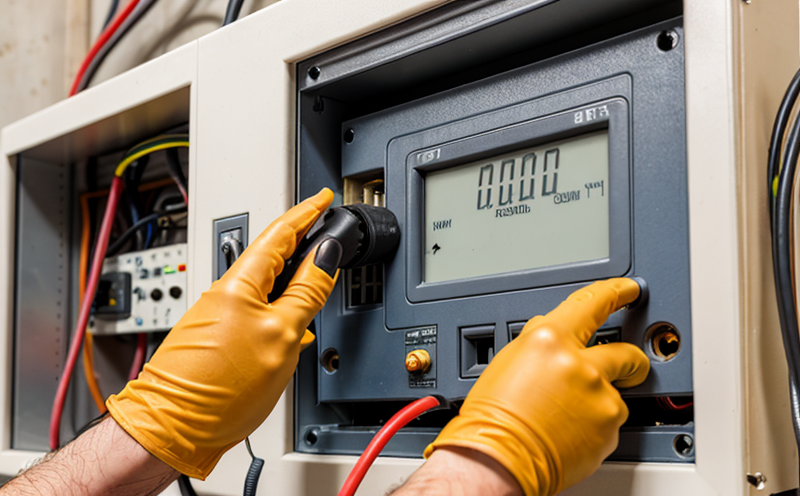ANSI C18.3M Part 1 Electrical Functional Testing of Small Battery Systems
The ANSI C18.3M standard is a comprehensive guide that ensures the safety and performance of small battery systems used in consumer electronics, medical devices, and other portable applications. This part specifically focuses on electrical functional testing to evaluate the operational integrity and safety of these batteries under defined conditions.
Testing according to ANSI C18.3M Part 1 involves a series of rigorous procedures designed to mimic real-world usage scenarios. These tests are crucial for ensuring that small battery systems meet stringent performance requirements, including voltage stability during discharge, temperature cycling, and over-discharge conditions. Compliance with this standard is particularly important in sectors like healthcare, where the reliability of portable medical devices can directly impact patient safety.
The testing protocol includes a variety of methods to simulate various operational stresses that small batteries might encounter in use. This encompasses both static and dynamic tests aimed at assessing how well the battery performs under different environmental conditions. Static tests involve measuring the open circuit voltage (OCV) and internal resistance, while dynamic tests focus on evaluating the battery's behavior during discharge cycles.
One of the key aspects of ANSI C18.3M Part 1 is its emphasis on consistency across different laboratories performing these tests. This standardization ensures that results are reliable and comparable, which is critical for manufacturers to ensure their products meet regulatory requirements and industry expectations. Compliance with this standard also enhances brand reputation by demonstrating a commitment to quality and safety.
The ANSI C18.3M Part 1 Electrical Functional Testing of Small Battery Systems is not just about compliance; it’s about ensuring that the products you bring to market are robust, safe, and reliable. By adhering to this standard, manufacturers can reduce the risk of product failure in critical applications, thereby protecting end-users from potential hazards.
For quality managers and R&D engineers, understanding and implementing ANSI C18.3M Part 1 is essential for ensuring that products meet not only regulatory requirements but also exceed customer expectations. This standard provides a roadmap for achieving these goals through precise testing protocols. For compliance officers, it offers a benchmark against which to measure ongoing performance and ensure continuous improvement.
The scope of ANSI C18.3M Part 1 includes detailed procedures for the electrical functional testing of small battery systems. These tests are conducted using specialized equipment designed to replicate real-world conditions accurately. The standard specifies the use of calibrated instruments, controlled environments, and specific test protocols tailored to different types of batteries.
Compliance with ANSI C18.3M Part 1 is not merely a regulatory requirement; it represents an investment in product quality and user safety. By adhering to this standard, manufacturers can ensure that their products perform reliably under various conditions, reducing the risk of failure and enhancing customer confidence.
Why It Matters
The importance of ANSI C18.3M Part 1 Electrical Functional Testing cannot be overstated in today’s interconnected world where small battery systems are integral to a wide range of applications, from consumer electronics to medical devices. These tests play a pivotal role in ensuring the safety and reliability of batteries used in portable equipment.
- Enhanced Reliability: Compliance with ANSI C18.3M Part 1 ensures that small battery systems function reliably under various conditions, reducing the risk of failure during critical operations.
- Safety Assurance: The standard provides a framework for assessing and mitigating potential safety hazards associated with small batteries in portable devices.
- Regulatory Compliance: Meeting ANSI C18.3M Part 1 requirements is essential for manufacturers to comply with international standards and regulations, thereby avoiding costly penalties and legal issues.
- Better Product Quality: By adhering to this standard, manufacturers can improve product quality and enhance brand reputation through consistent performance across different batches of products.
The ANSI C18.3M Part 1 Electrical Functional Testing is not just a compliance exercise; it’s an essential step in ensuring that small battery systems perform reliably under various conditions. This testing ensures that the batteries used in portable devices are safe and dependable, enhancing user experience and reducing potential risks.
Benefits
- Improved Product Safety: ANSI C18.3M Part 1 testing helps identify any issues with battery performance early in the development process, ensuring that only safe products reach the market.
- Enhanced Brand Reputation: Compliance with this standard enhances brand reputation by demonstrating a commitment to quality and safety, which is crucial for maintaining customer trust.
- Increased Customer Confidence: By adhering to ANSI C18.3M Part 1 standards, manufacturers can provide customers with products that are reliable and safe, thereby increasing overall satisfaction.
- Cost Savings: Early identification of potential issues through testing can prevent costly recalls and repairs later in the product lifecycle.
The benefits of ANSI C18.3M Part 1 Electrical Functional Testing extend beyond mere compliance; they contribute significantly to the overall success of a product by ensuring its reliability, safety, and quality. This standard plays a vital role in safeguarding end-users from potential hazards while enhancing brand reputation.
Use Cases and Application Examples
The ANSI C18.3M Part 1 Electrical Functional Testing is widely applicable across various sectors where small battery systems are used, including consumer electronics, medical devices, and portable power tools. Here are some specific use cases and application examples:
- Consumer Electronics: Small batteries in smartphones, tablets, and wearables require rigorous testing to ensure they perform reliably during daily usage.
- Medical Devices: Portable medical devices such as insulin pumps and blood glucose monitors rely on small batteries for continuous operation. ANSI C18.3M Part 1 ensures these batteries meet the stringent safety requirements necessary in healthcare applications.
- Portable Power Tools: In industries like construction, ANSI C18.3M Part 1 testing is essential to ensure that power tools operate safely and reliably under various conditions.
In each of these sectors, ANSI C18.3M Part 1 Electrical Functional Testing plays a critical role in ensuring that small battery systems meet the highest standards of safety and performance. By adhering to this standard, manufacturers can ensure their products are reliable, safe, and compliant with international regulations.





